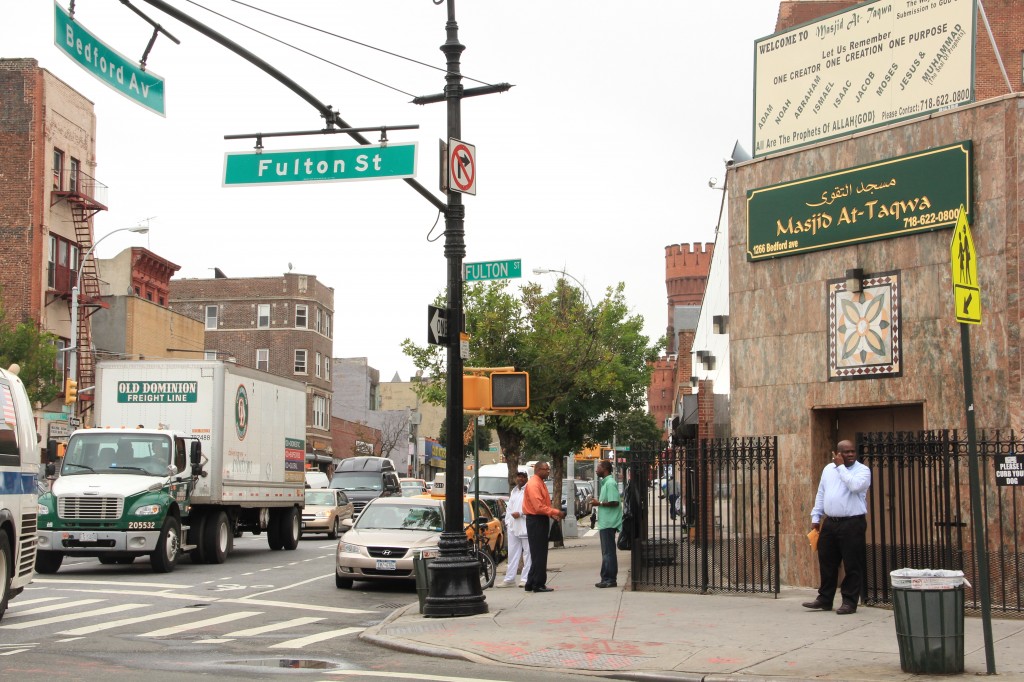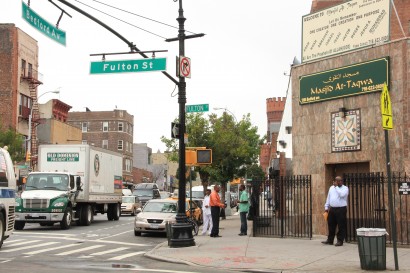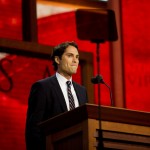Osman Adam, 49, sits in his perfume shop wearing the observant Muslim’s brimless cloth cap and long thobe, attending to customers at the counter and receiving visitors. He’s originally from Sudan, and his shop is next to Masjid At-Taqwa, in Brooklyn’s Bedford-Stuyvesant neighborhood, where hundreds of Muslims worship each day.
Like other Muslim immigrants in the neighborhood Adam finds himself defending his religion from both an anti-Islam video that was widely viewed in the Muslim world and violent anti-American protests in a number of countries, spurred by the video.
He explains his reaction and the widespread protests simply: “It’s obnoxious. It’s insulting to a billion and a half Muslims.”
Adam says he supports people’s right to protest peacefully, but he distances himself — and Islam — from the violence, the attacks on U.S. embassies, and the deaths of U.S. diplomats in Libya. Adam says he can’t answer for the actions of people on the other side of the world, but thinks it’s a mixture of frustration and mob mentality, “a lot of times people don’t react rationally.”
What he does defend vigorously is his religion. “From an Islamic point of view, you don’t kill innocent people. There’s no justification for that whatsoever. I feel sorry for those who got killed” emphasizing that in Islam, “violence is not accepted.”
A few doors down at Al Pasha restaurant, recorded verses of the Quran pour out of audio speakers. The owner Ali Mohammed is originally from Egypt. He says he understands the value of freedom of speech, but he’s frustrated by the irresponsibility of the video. He believes that “definitely, something has to be done internationally,” to stop anti-Muslim actions, like the video or burnings of the Quran, that set off a string of events. But of the attacks on U.S. embassies he says, “we are really against it.”
Sami Hakim, who was sitting down to lunch at Al Pasha, is also from Egypt. He said that he understands Mohammed’s frustration, but that “America is a big country, and free,” and that there’s no real way for America to stop what is going on, adding sardonically that the U.S. can’t go to war against individuals’ actions.
Asked if the violence in the Middle East has impacted their lives in the United States, all three men said they haven’t been directly affected by the video, or the protests. “Nothing has happened. I’m just upset,” Hakim said.
Their positions echoed that of the Islamic Society of North America’s President, Imam Magid, who said in a press release, “Although we believe that this video is hateful and bigoted, this could never be an excuse to commit any acts of violence whatsoever. The Prophet (peace be upon him) is loved and respected by hundreds of millions of people across the world, and no one can take this from our hearts. No one should fall into the trap of those who wish to incite anger.”
Gadeir Abbas, staff attorney for the Washington D.C.-based Council on American-Islamic Relations, said that there have been a few incidents of vandalism in the past week that could be related to the events surrounding the video, but he noted there hasn’t been the sort of stark outburst of retaliatory anti-Muslim activities seen in the past.
What he is concerned about is that the violence surrounding this video “creates a space for anti-Muslim activists to peddle their political agenda,” and that the “acts of violence unfortunately provided another piece of evidence for anti-Muslim activists to point to Islam as a purveyor of violence.”
Eleven years after 9/11, Abbas feels that anti-Muslim sentiment has changed, as it moves into a policy debate. He notes that, “a decade ago, or even five years ago, it would have been unimaginable to think that there would be 70 bills in 30 states that target Muslims alone.” He cites an Oklahoma measure that would ban Sharia law from state courts. The measure was approved by 70 per cent of Oklahoma voters in 2010, but was overturned by a federal judge earlier this year.
Abbas says that “government policies justify the unfounded fear that some Americans have about Muslims.”
In Brooklyn, a number of Muslims Fi2W approached were reluctant to speak about the video and the violent reaction to it. Osman Adam at the perfume shop said many people are wary of the media “twisting the story.”
Abbas agrees that, “there’s sometimes a fear that attracting attention to oneself will cause the anti-Muslim ugliness to be directed to them,” and that, “anti-Muslim activists have created an environment where some are afraid to stand up.”
However, he sees this changing, noting that Muslims, as a community, are relatively new in America. He says that with each new mosque, American Muslims will be able to communicate more effectively, become more organized and able to project a voice to the larger community.
It’s an idea Sami Hakim sees as the real solution: “The only way to stop anti-Muslim sentiment is if people have a better understanding of Islam.”
Fi2W is supported by the New York Community Trust and the John S. and James L. Knight Foundation with additional support from the Ralph E. Odgen Foundation and the Sirus Fund.





